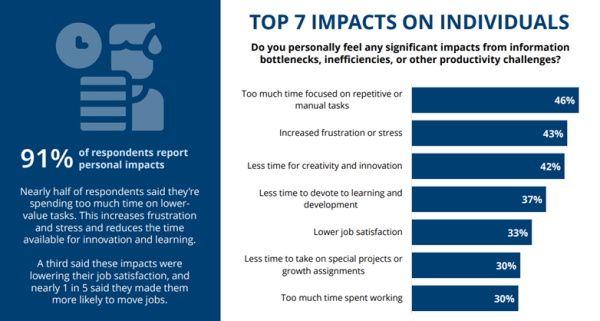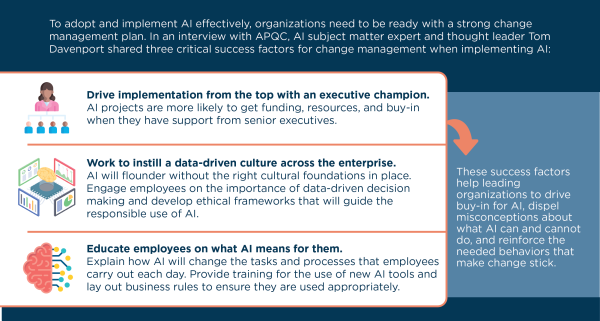
As knowledge management professionals, we are bombarded almost daily with information about artificial intelligence (AI), specifically generative AI (GenAI) capabilities such as ChatGPT, Google’s Bard, and DALL-E2. But did you know AI has been around for a long time now? In fact, according to TechTarget, the introduction of AI can be traced back to the 1950s. But recent advancements in Gen AI tools have it front and center in all our minds due to its ability to generate unique, realistic content.
Did you also know that while all this hype around AI is happening, organizations are increasingly recognizing the need to invest in structures and processes to manage enterprise content? The problem of time being wasted in finding, recreating, and duplicating information continues to plague knowledge workers. In fact, APQC’s research shows that the average knowledge worker spends:
- 2.8 hours each week looking for or requesting information
- 2.0 hours recreating information that already exists, and
- 1.7 hours providing duplicate information or repeating the same answers and updates.
When good content management meets AI
Good technology platforms, processes, and capabilities for content management are all critical pieces to implementing and leveraging AI effectively. AI-powered search, recommendations, and now, generative AI capabilities can help create unique, innovative content, and are all fantastic tools to get the right content to the right user at the right time. Unfortunately, for those who want to plug and play, these technologies cannot achieve their full potential without first having good content management processes in place and people to oversee and execute them.
According to APQC’s research four key challenges exist for organizations related to managing content:
- redundancy and inefficiency
- inconsistency
- content silos
- poor quality.
APQC highlights how these challenges can impact individual user experience in seven key areas.
If you begin your AI journey without considering these challenges and impacts, it will be like building your dream house without a solid foundation. It may look good on the outside, but the first strong wind could bring it down due to its shaky ground.
Many organizations experienced the same challenges when implementing enterprise search technologies or developing repositories without proper content management in place first. Some also run into problems structuring or tagging information and knowledge without a proper subject matter expert or content author partnership, resulting in multiple unused or duplicative repositories, ineffective search, and frustrated employees.
3 Actions to Leverage AI
Now that you understand the importance of good content management, let’s assume your KM team has done its due diligence in prioritizing and implementing proper content management processes, capabilities, and behaviors. The next step is to adopt and adapt to a culture of leveraging AI. Here are three actions to consider:
- Ensure there is a valid business reason and purpose for AI and work with your organization’s leaders to develop use cases to experiment and learn before implementing broadly. Implementing technology for the sake of technology because it's new and “everyone is doing it” will not lead to success and will further frustrate employees.
- Engage the right partners in the development of your AI strategy and implementation. IT should not be expected to drive this alone. It takes partnership with teams such as KM to ensure the structure and relevancy of the organization’s content is sound (as mentioned above), Legal and HR to ensure ethics and intellectual property policies are enhanced, and core functional teams to ensure continued alignment with business objectives and prioritization of AI use cases.
- Consider the impact on the people with something as large as AI. This is in the news every day and affects individuals and the culture within an organization. AI can instill fear, uncertainty, and excitement. Those involved in the implementation of AI should ensure a solid change management approach to engage early adopters and help other individuals prepare and adapt to a new era that includes AI. In an interview with AI subject matter expert and thought leader, Tom Davenport, he shared some critical success factors for change management when implementing AI, including:
Learn more about knowledge content management and AI in Managing Content So It's Fresh and Findable and Three Critical Success Factors for Implementing AI.

